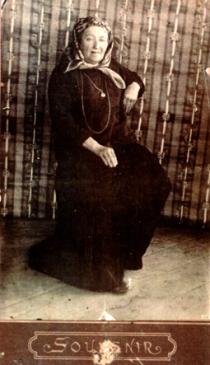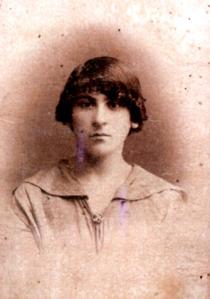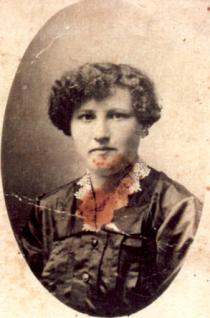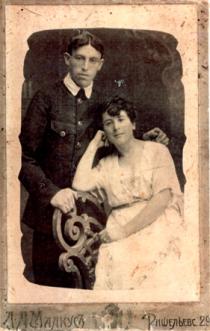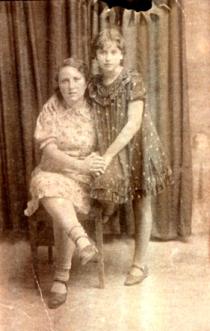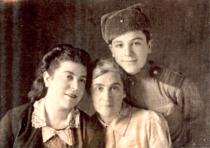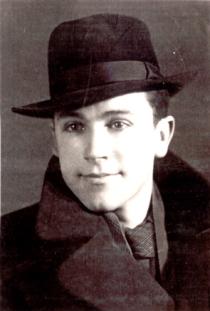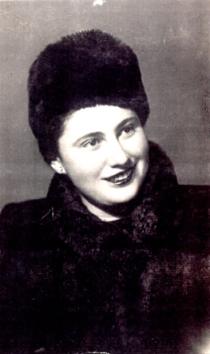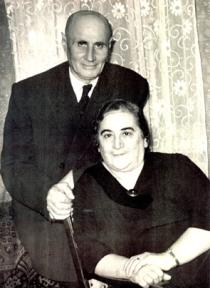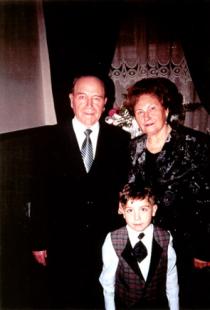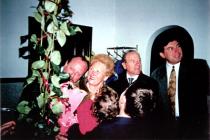
Aron Rudiak
Ukraine
Ternopol
Interviewer: Zhanna Litinskaya
Date of interview: September 2003
Aron Rudiak is full of charm. He is a slim dressed to modern fashion man. His wife Lubov offers me a cup of coffee. I knew their age, but I was surprised to see that they don’t look it: they make a beautiful couple and have young shining eyes. They live in a big apartment in the very center of Ternopol. They have new modern furniture, music devices in their apartment and the latest design electric appliances in their kitchen. One can tell that they are wealthy. During our interview Lubov comes into the room every now and then sympathizing with her husband and his life story. Therefore, I give her an opportunity to talk about herself at the end of our interview. Meeting with this couple makes a good impression on me. I feel like seeing and talking to them again, so comfortable they make me.
My family came from Zhabokrich village, Kryzhopol district, Vinnitsa region [300 km from Kiev]. I have dim memories about Zhabokrich since I only lived there in my early childhood and when at school I visited my grandmother once or twice. I don’t have any information about the village before the revolution of 1917 [1]. I only remember it in the middle of 1930s. This was a picturesque village with a big park and a lake in the center. There was music playing and young people rowing, playing volleyball and football on the sports grounds in the park. We, kids, liked to lie in children’s playground. Zhabokrich was a village, but it was more like a Jewish town since Jews constituted 80% of the whole population. Like everywhere else within the Pale of Settlement [2] they lived in the center of the town and dealt in crafts and trade. Some had kitchen gardens and kept livestock. The rest of the population – they were Ukrainians, lived in the outskirts. They were farmers. I don’t remember a synagogue in the town, but I believe there must have been one since my paternal grandmother Chaya attended a synagogue.
My father’s parents Chaya and Aron Rudiak were born in Zhabokrich in 1860s. The family name of my ancestors sounds like a Ukrainian name and this shows how deeply intertwined were Ukrainians and Jews that had lived together for centuries. I don’t know what grandfather Aron was doing before the revolution of 1917. He had died long before I was born. All I know is that his family was poor. Grandmother Chaya lived in a small house with thatched roof. Most of Ukrainian population lived in such houses at that time. My grandmother had a kitchen garden and kept poultry and a cow. Grandmother spoke Yiddish at home and switched to Ukrainian when talking to her Ukrainian neighbors. She spoke Ukrainian with a strong Jewish accent. She was religious and didn’t work on Saturday. Her Ukrainian neighbor came to look after the cow and poultry on Saturday. I have dim memories about us, grandmother’s children visiting our grandmother on Friday and sitting on a small wooden coach. Grandmother lit candles to greet Saturday and gave us delicious fresh milk. By 1941 all children had left their home and only came to visit their old mother occasionally. When Germans came to the village our poor grandmother tried to leave the village, but it was hard for her to walk and she returned. Grandmother Chaya and other Jews in Zhabokrich were shot in late July 1941. My grandmother’s neighbors told us this story at the end of the war.
Grandmother Chaya had practically no education. Like many Jewish girls she didn’t study, but she knew her prayers and could read in Hebrew. She got married at a very young age. My grandparents had 14 children. Only five survived: the others died as infants and two or three perished during pogroms [3] during the Civil War [4]. I only know the name of my father’s favorite brother Menachem of those that perished. He was one year older than my father. My father was wounded when they were attacked by some bandits, but managed to escape. His brother Menachem died. I also knew my father’s three sisters: Chana, Rosa and Buzia and two brothers: Isaac and Yudko. All boys finished cheder and went to a primary school for few years, but girls didn’t study and were actually illiterate. When they grew up they gave up observing Jewish traditions.
The oldest of my father’s living sisters was Golda, born approximately in 1880s. She didn’t get any education. She was married. Her husband’s [family] name was Novak. Her husband died before I was born. I don’t know what caused his death. Golda and her four children lived in Zhabokrich . In early 1930s they moved to Odessa. Golda was a housewife and her children worked to support her. During the Great Patriotic War [5] Golda was in evacuation. After the war she returned to Odessa. She died in early 1960s. Her older son Lev, born in 1900s, his wife and son were in evacuation and lived in Odessa after the war. I don’t know when Lev died, but his son works as a construction engineer in Odessa. Golda also had three daughters: Chana, Rosa (her Jewish name was Reizl) and Buzia. Chana was married, but didn’t have children. She had a problem with giving birth to her first baby and could not have children afterward. However, she got pregnant again and during her second childbirth she lost her speech ability and it took her few years to resume it. In evacuation during the war Chana’s husband left her and she lived with her sister Rosa since then. Rosa’s husband David whose last name I don’t remember perished at the front in 1941. Rosa’s daughter got pregnant after the war having no husband and Rosa was so affected by this disgrace that she died from heart attack. Chana raised Rosa’s granddaughter that was illegitimate. The younger daughter Buzia didn’t have children. Chana and Buzia died in Odessa in the middle of 1970s.
My father’s sister Ghenia was born approximately two years before my father was born, approximately in 1895. Her husband Elia Gershgorn was younger than aunt Ghenia and for this reason my aunt always kept her age a secret. She didn’t have any education and was a housewife. Ghenia and her daughter Anna were in evacuation and Elia was at the front during the Great Patriotic War. He returned home, but died shortly after the war. Ghenia died in early 1950s. Their older son Aron studied in a military medical school and when the war began he went to the front with other cadets of this school. Aron worked in a field hospital during the war. After the war he finished a Medical College in Odessa and became a surgeon. He had a Moldavian wife. They had two children: a boy and a girl. Aron went to work in the north to earn money to buy an apartment. By a wicked twist of fate he died from appendicitis there in the middle of 1970s. He saved hundreds of lives, but there was nobody available when his life was at risk. I have no contact with his family. Aron’s sister Anna, born in 1928, married a Jewish man from Zhabokrich. After finishing Technological College of Flour Grinding Industry in Odessa they worked in a Baltic Republic, I don’t know where exactly. Anna died from kidney cancer when she was young.
My father’s brother Isaac, born in 1905, worked at Vapnyarka railway station near Kryzhopol in Vinnitsa region. About two weeks after the war began Isaac, his wife Malka, their children Betia, Rosa and Aron were evacuated from the town. After the war they lived in Zhuravlyovka station, in Vinnitsa region where Isaac died in a train accident in 1953. I didn’t grieve after him. The reason is that I couldn’t forgive Isaac that he didn’t pick grandmother Chaya when going in evacuation near Zhabokrich. It was an exaggerated attitude that young people often have. I have no information about Isaac’s children.
I don’t remember Yudko, my father’s youngest brother, ‘the little finger’ so much loved by grandmother. He went to the front in 1941 and disappeared.
My father Duvid Rudiak, born in 1897, finished cheder and a primary school, I guess, since he could read and write. My father worked at an agricultural cooperative that later became a kolkhoz [6] in the village.
As for my maternal grandmother Frieda, born in early 1880s, I didn’t know her. All I know is that she died at childbirth at the age of 33. I knew my grandfather Nuta Grievski very well. He was born in Zhabokrich in middle 1870s. Of my grandfather’s relatives I can dimly remember his brother Leiba who was a carpenter. Nuta worked in an agricultural cooperative like my father. I don’t know exactly how he earned his living before the revolution of 1917, but I think that he made his living as a carpenter. His family lived in a big wooden house that Nuta built himself. I don’t think they were poor.
My mother was the oldest child in her family. Her younger sisters Sonia and Ghenia only studied in a primary school for few years. They were workers at a wool factory in Odessa. Sonia, born in 1907, married Efim Balin, a Jewish man. He was production engineer at the wool fabric factory in Odessa. Efim perished in Odessa on the first days of the Great Patriotic War and Sonia refused to evacuate after he died. She and her two children: Yura, born in 1938, and a week’s old baby boy perished in the first days of evacuation in Odessa. Sonia’s younger sister Ghenia also perished because Sonia refused to evacuate. Ghenia’s husband Michael whose last name I don’t remember was at the front during the war. When he returned to Odessa he got to know that his wife and their two children Alexandr and Emma had perished. My mother’s younger brother’s (Grigori) wife also perished in Odessa. Grigori, born in 1915, perished at the front. His young wife that gave premature birth to a baby on 22 June 1941 caused by the stress also perished with her baby and her old father.
My mother Ruchlia, she was called Rachil at home – also a Jewish name sounding alike - was born in 1900. This was her actual date of birth, even though in her passport the date of birth was 1902. When my mother was to enter a grammar school in Odessa she was overage and her parents subtracted two years to make her admission possible. My mother was the only one in her family to finish a grammar school. After finishing school she returned home to Zhabokrich.
My parents knew each other since their childhood and decided to get married when they came of age. They got married around 1922. My mother’s family was rather religious and they had a traditional Jewish wedding with a chuppah arranged by my mother’s distant relatives in Odessa [7].
In 1923 my older sister Frieda named after our grandmother was born and I was born on 13 November 1925. I was named Aron after my father’s father. I need to mention here that all first sons in my father sisters and brothers’ families were named Aron. I spent the first years of my childhood in grandfather Nuta’s house in Zhabokrich. One of my first childhood memories is of the children’s room with drawn curtains where my sister Frieda is lying with measles. I stayed in the same room with her since doctors commonly believed that if somebody in the family had an infectious disease the others had better had it, too. However, I didn’t contract measles from my sister, even though we were staying in the same room. I remember swinging in the park. My grandfather’s Leib made me sleighs and I skated down a hill in winter. There was a big veranda with stairs leading to it in my grandfather’s house. I often played there with my cousin brothers and sisters. I remember getting scared of a calf that probably wished to play with me. I hid in a puddle near the house with my head under the water. Everybody burst into laughing and my father got me out of the puddle and took me into the house to wash me. I also remember a small square near our house where there was a market once or twice a week. We liked going there after it closed to pick up corns, sunflowers and other leftovers.
I cannot remember any details of the Jewish life of our family. I remember that grandfather wore a kippah at home and a big hat to go out. I also remember that my parents attended a synagogue, but I don’t remember the synagogue in the village. I remember Chanukkah when all grandchildren came to grandmother Chaya. We received treatments of sweets and few coins as a gift. I don’t remember other holidays since I was too young.
In 1929 our family moved to Odessa. Our mother’s distant relatives gave us accommodation in a small dark room with no widows. As soon as we moved in I opened the door from where light could be seen. I saw a big brightly lighted room where the family of our relatives was sitting. A dame at the table said strictly ‘Boy, you can’t come in here!’ I was used to warm and affectionate attitude of my family and this comment hurt me. However, I got used to our small room where we lived for over seven years. This apartment was near the synagogue that our relatives attended in the very center of Odessa.
My father went to work as a fat loader at a buttery. My mother went to work as an assistant accountant at a garment factory. My sister Frieda studied in a Jewish school in Zhabokrich . Our parents submitted her documents to a Ukrainian school in Odessa. Children were admitted to schools based on their national origin and special commissions made inspections to identify any Jewish children in Ukrainian or Russian schools. Our parents decided to send my sister to a Ukrainian school. My mother instructed my sister to not react to any Jewish words that she might hear at school. We understood Yiddish. Our parents often switched to Yiddish at home. Once Frieda came home from school with tears in her eyes. She said that she incidentally answered a question in Yiddish and was afraid that they might send her to a Jewish school, but nothing happened. She remained in her school.
I hardly remember my kindergarten. I didn’t care about children’s ways of spending time. I liked counting and arithmetic that my sister was teaching me. I liked being at home and was glad to stay at any occasion, even when I fell ill and didn’t have to go to kindergarten. Once my father had to go to hospital with stomach ulcer. He was prepared to a surgery. Grandmother Chaya somehow got to know about it. She came to Odessa when I was at home. We went to my mother’s work and from there we went to the hospital. My grandmother had an appointment with the chief doctor and refused to give her permission to the surgery. She took our father to her home in Zhabokrich and a month later he returned looking healthy and strong. He had tests made and there was no ulcer identified. My father gave up smoking when staying in the village and I decided for myself that smoking was bad and never ever had one single cigarette.
In Odessa our parents didn’t celebrate holidays or observe traditions. My mother fasted at Yom Kippur while my father said that since he had to work hard physically he could allow himself to not fast. This was the only tradition mother observed. My father wasn’t a Komsomol [8] or Party member, but he was a real patriot and piously believed everything the Party or Government promised. Even famine in 1932-33 [Famine in Ukraine] [9] when there was a food coupon system, but it wasn’t always possible to receive bread per bread coupons didn’t shatter his belief in socialism and communism that our propaganda proclaimed. At that time my sister or I stood in long lines to get some bread. When a shop opened in the morning a crowd broke inside the shop and children climbed on heads to get to a counter. There was not enough bread in stores. I remember homeless children stealing bread, running away with it biting off big pieces and swallowing them. Once our mother paid a lot of money for a loaf of bread at the market. When she brought it home it turned out to be a baked in brick. Our mother took her few pieces of jewelry to a Torgsin store [10]. I hadn’t been there, but I know that one could buy food products for gold or hard currency. I didn’t suffer from hunger. I was a tiny boy and didn’t have a big appetite. I remember our mother bringing home a chicken in 1933 when the period of famine was almost over, but a celebration didn’t work out. My sister decided to cook chicken and burnt it. We were very upset: we hadn’t had chicken for years and looked forward to have a piece.
I went to school in 1933. At first I went to the school located in few blocks from our house, but then a new school was built in our yard and my mother brought my documents to this school. This was a Ukrainian school. There were Russian, Ukrainian, Polish, Jewish, Bulgarian and Greek children in our school. Odessa is a multinational town. I never faced any national segregation or abuse at school. We didn’t care a bit about nationality. We were Soviet children. I became a pioneer at school and had some chores related mostly to helping other children to improve their studies. I had all excellent marks in the course of my studies. I was short, but I went in for track-and-field events, but I was mostly fond of mathematic. I managed to find mathematical dependences in everything: in biology and in everyday life.
My classmates and I were friends. We celebrated 1 May and October Revolution Day [11] in autumn. We went to parades and then walked in the town. At home my family had a festive dinner on these days. We sometimes visited my mother’s sisters that also celebrated Soviet holidays. As for Jewish holidays, I didn’t know any at that time. Grandfather Nuta living with his daughters taking turns to look after him celebrated Sabbath and went to synagogue on holidays. We didn’t have guests since we lived in such small room until 1937. In late 1937 my father received a one-room apartment. There was one big room and a kitchen in it. Since then guests began to visit us. In 1939 our father was injured at work: he had his both legs fractured and after he recovered he was appointed to a position of production engineer. There was not a word said about arrests of late 1930s [Great Terror] [12] in our house. Our father believed that everything happening in our country was correct and was not subject to discussion. Nobody of our relatives or acquaintances suffered.
In May 1941 I was awarded a second prize at the Odessa regional Olympiad in mathematic. I was supposed to receive my award in late June, but I never received it since the Great Patriotic War began. At that moment I was visiting my aunt Sonia. Since 14 June she had been staying in a maternity home where she gave birth to a boy on 15 June and I was staying at her home looking after my 3 or 4-year-old cousin brother Yuri. On 22 June I gave my cousin breakfast as usual and sat down to do my mathematic. In the after noon my father came. He was supposed to go on business trip on Friday and I was surprised to see him. He said ‘Aron, get ready to go home. A war began’. At that time Efim and Sonia and the baby came home from hospital and I could go home with my father without worrying about Yuri. My father and I took a tram home. Usually it took twenty minutes to get home, but this time it took us about two hours. There was air raid announced several times. People didn’t know what to do, but there were no bombs dropped yet. The enemy’s planes just flew in the sky ringing panic. At home I heard that the outskirts of Odessa were bombed and the radio announced that Kiev was bombed, too.
Efim Balin, Sonia’s husband, was an officer in a military unit near Odessa. He went to his unit, returned home a day or two later and then we went to see him off to the railway station where he was to take a train to go back to his unit. This was the last time we saw him. It turned out that he failed to get to his military unit. He must have perished during an air raid. We knew that Germans were dropping bombs on strategically important facilities: the harbor and big plants and during air raids we were trying to find shelter at some distance from those facilities.
About ten days after the war began my father’s brother Isaac arrived. He was evacuating with his family and for some reason came to Odessa. I don’t know how he failed to take grandmother Chaya with him: whether he was pressed for time, or he didn’t have a chance. Isaac told my father to pack and evacuate as soon as possible. My father had a ‘white card’ [this was a release from military service in the army issued by a medical commission that determined whether a man was fit for military service] due to his injury, but he said it was a disgrace to flee in evacuation rather than defend Odessa and the country from the enemy. He didn’t believe that the enemy would come to Odessa. Isaac tried to convince our parents to agree to send the children or at least my older sister with him, but our mother said we would be together whatever happened.
The first massive bombing occurred one moth after the war began. We children began to play war games forgetting about horrific reality. Children are children. During air raids we found shelter in a nearby trench. Our mother made us bags where she put dried bread, underwear and soap in case we lost each other. Many people carried such bags in the town. After this bombing there were bombings at night. We were getting used to them and didn’t even bother to hide. Our father didn’t even want to hear about evacuation. On 27 July 1941 he went to a military registry office. He was an invalid with his one leg shorter than another, but he volunteered and was recruited in the army. We went with him to the gathering point. When saying farewells our father kept saying that Odessa would not be occupied. Our mother didn’t even try to discourage him since she understood that he was so dedicated to defend his Motherland that there was no chance to talk him out of it.
Soon refugees from Bessarabia [13] began coming to the town. They slept in parks, gardens and even in the yards telling people about fascist atrocities on occupied territories. We felt worried and our mother also began to consider evacuation. There were battles near Odessa. Germans drowned a raid ship and the front was actually open for several days. The front was very near. It was strange to see the military going to the front by trams. Ghenia’s husband Michael was recruited on one of those days. He had a ‘white card’, but nobody cared about such things: they recruited everybody who was able to hold weapons. I remember a governmental appeal to residents of Odessa that said ‘Boiling water poured on occupants’ heads and a stone thrown on them shall help us to forge victory’. At the beginning of siege Kuban and Don Cossacks [14] came to the town riding their horses and beautiful uniforms. They carried their swords and posters ‘Kuban – Berlin’ and ‘Don – Berlin’. They were full of patriotism in their determination to defend their Motherland, but what could they do with their bare hands? Few survivors, wounded and bleeding came back to town soon. They had no horses or swords with them. A human being gets used to everything. We began to live a routinely life in siege. There were lines to buy fruit, vegetables, fish and watermelons. During air raids people hid in shelters and after it was over they returned to their lines. Our battleships were close to the shore shooting across the town and it might have made a beautiful sight for boys had it not been acute risk to life.
We spent most of the time with aunts Sonia or Ghenia – it was easier to be together. One day Michael came home. He was wounded in his jaw. He had his head bandaged and bloodstains on him. He told his wife to pack and evacuate with his hospital. There were 120 slightly wounded patients that were going to a rear hospital. Ghenia refused saying that she was staying with her sisters. Michael had to go since there was a bus waiting for him. He left. I kept telling my mother and aunts that we needed to evacuate. Boats transporting the wounded and evacuating people were sinking one after another. The ‘Lenin’ boat transporting all higher Party officials and elite – actors and scientists – drowned. There were only few survivors and the rest of them perished. Couriers from our district executive committee [Ispolkom] [15] were bringing us evacuation tickets almost every day, but our mother and her sisters were afraid of getting aboard ships. I insisted that we had to evacuate. I was convinced that we would manage all right. Finally, mother agreed and on 28th September she received two evacuation cards: one for herself and one for my sister. I didn’t need a document.
On 29 August early morning we packed our belongings and went to the harbor. I was carrying a bag with our biggest value; sewing machine ‘Singer’. There was a log line to get on board a ship. There were air raids and bombings, but nobody left the line. Grandfather Nuta and my mother’s sisters came to see us off. Sonia probably felt sorry that she refused to evacuate and her sisters, children and grandfather were staying because of her. She said they were evacuating with a next boat. People dropped their suitcases and bags in a huge net container that was loaded on the boat with a crane. The crane operator missed the boat several times dropping bags into the sea. We were among the last passengers boarding the boat and got on an upper deck. Grandfather came to the boat with us and our mother asked him to stay with us, but he said he couldn’t leave his daughters Sonia and Ghenia and Grigori’s wife with the baby behind and promised that they would leave Odessa on the next boat. We said our good byes. German planes began shooting at the boat, but our antiaircraft guns kept the enemy off. The ‘Dnepr’ boat was slowly moving away from the berth. In my thoughts I was saying ‘good-bye’ to my hometown and wondered whether I would ever see it again.
The boat was under shooting several times, but on 30 we successfully arrived at Novorossiysk 300 km to the east from Odessa. Few passengers formed a commission that released the luggage to others. We were glad that our luggage was not lost. On 4 September we boarded a freight train for cattle transportation heading to the east. It went across the Northern Caucasus, Penza, Kuibyshev, Cheliabinsk, Sverdlovsk [today Yekaterinburg] and few other towns until we arrived at Kustanai in Northern Kazakhstan, 2000 km from home. Kustanai was a regional town. I was used to living in a big and beautiful town and was surprised to see small houses made of saman – airbricks. They were cold houses and I slept in my winter coat. We arrived on 17 October. During our trip I wrote letters to my aunts telling them what they needed to take with them for the trip, but they never left Odessa. We didn’t have any information about my father. In late September 1941 we received a letter from him from Mariupol on the Azov Sea. He wrote he was sorry for having told us to stay in Odessa and that he wished we had evacuated. I guess he had had his share of grief and ordeals.
We were accommodated in a school building. Few days later chairmen of Kazakh kolkhozes came to select groups of people. They were wearing big fur hats and winter coats: it was already cold at this time of year in Northern Kazakhstan. Frieda had finished school with honors before the war. She entered the State Teachers’ College in Kustanai. I didn’t have any documents from school with me since my school had closed before we left. I only had an award of honor for finishing the eighth grade. I entered a Medical School with this honor. I attended classes and two or three days later I told my mother that I couldn’t study medicine since there was no mathematic or physics that I was fond of. The only word I learned in this school was ‘defecation’. I was admitted to the third year of Teachers’ School, but it was closed a month later and senior students including me were transferred to the college where Frieda studied. They formed a Natural Geographic Faculty of ten students: two guys and eight girls. We had wonderful lecturers that were professors from Moscow, Kiev and Leningrad colleges. My mother and sister rented an apartment and lodged a girl that studied in college. I went to live in a hostel. I passed my first exams with only excellent marks. I also worked in ‘Trudovik’ shop. We made gloves and foot wraps for the front and received food products for our work. I studied there during 1942. In late December recruitment of the young men, born in 1925, was announced. Being a disciplined young man I went to the recruitment office, although I didn’t get any summons. When they measured my height it turned out to be 149.5 cm while they only recruited men of at least 150 cm height. An officer making measurements wrote 150 cm in my certificate. When somebody mentioned to him that second-year students were subject to delay of recruitment he waved his hand and said ‘He will finish his studies after he returns from the front’. The shop where I worked gave me a winter jacket, a hat, fur boots and a vest. I gave these to my mother leaving only a vest for myself. After the medical examination we waited for another month: we stayed in the recruitment office overnight going home in the morning. On early morning 12 February we were woken by alarm, marched across the central street of the town and got on a freight train that headed to the north. We moved 700 km to the east from Tyumen where we were assigned to 2nd Aviation School of Tyumen. A doctor of the medical commission of the school didn’t approve me due to my height and complained of the doctor in Kustanai for having sent them such poorly weak fresh forces. Ten other recruits were disapproved. We were taken to a station from where we walked 25 km to Krivosyolki, [about 3000 km to the north-east from Kiev] village. I was assigned to accompany of gunmen of the 2nd reserve riflemen battalion. We were to take a 6-month training studying battles, attacks, defense from tanks, etc. I didn’t have any problems with my training. We got sufficient food. I didn’t eat much and even managed to send a parcel to my mother and sister in Kustanai. From my unit I mailed a search request about my father and received a response. It said that my father Duvid Rudiak disappeared near Mariupol in October 1941. He must have perished when fascist troops landed in Mariupol. I didn’t inform my mother or sister that father had perished, but I gave an oath to myself to take revenge for my father. Once, when we were lined up my commanding officer, a senior lieutenant, found my student’s record book. Commanding officer of our regiment called me to his office. He said that since I had education he wanted me to speak about fascist atrocities in front of the regiment. We were aware of mass shooting in occupied territories. I prepared a speech and spoke in front of my fellow comrades. I had to stand on a box to be seen from behind a stand, but I made a very good speech. In 1944 I became a member of the Communist Party. There were no special ceremonies, it became a routinely procedure, but I believed it to be my duty to be in the first rows of fighters for the victory over fascism. I received my Party membership card at a meeting few months later.
I requested to send me to the front several times. My cousin brother Aron wrote me from the front to try to be no fool, if possible, but I was a patriot and was eager to take revenge for my father. One day my commanding officer told me that I was to go back to my studies in college according to another order issued to confirm that students were to get a delay from service in the army. He asked me ‘Well, will you go back to college now or after the war?’ and I responded bravely ‘We need to beat fascists first’. After our training was over my commanding officer tried to convince me to stay at school. He said I was needed there and I agreed to stay and work in the regiment office.
My mother and sister returned to Odessa after it was liberated in 1944. They failed to get their apartment back, even though authorities were to support the needs of those whose relatives were at the front. Our neighbors – a Bulgarian family – took them to their apartment. They also told them that grandfather and my aunts with their children had perished in Odessa in late October. Fascists burnt several hundreds or a thousand Jews in a barrack.
In late 1944 I was offered to accompany a group of recruits, born in 1930, to Donetsk region. They were too young and their commandment decided to let them go home. I agreed to go with them under condition that I could visit my family in Odessa. On our way to Donetsk we changed 5 trains. From Donetsk I went to Odessa. Entrances to houses in Odessa were kept locked and when I knocked on the door and the concierge opened the door she didn’t recognize me. I grew up 20 cm in half a year. My mother didn’t recognize me either thinking that it was one of her nephews coming home. There was a lot of laughter, joy and tears when she finally acknowledged her son. It turned out that my mother and sister knew about my father, but didn’t want to let me know protecting me from grief. I stayed a week in Odessa, received my food ration and left it to my mother and sister: they became very thin during the war. I returned to my military unit. In summer 1945 I came to Odessa on leave.
I demobilized after the decree issued on 25 October 1945 for wounded veterans, specialists, teachers and 2nd-year and senior students were subject to demobilization. I arrived in early October and submitted my documents to Odessa Construction Engineering College. Rector of the College was telling me to take a year’s leave to take a rest, but I was eager to go back to studies. I was admitted and a month later I passed my half-yearly exams successfully. I had only the highest grades and could apply for Lenin’s stipend [the highest stipend in higher educational institutions in the USSR awarded to the best students for special merits. Maximum 10 students in each institution could be awarded this stipend], but it was awarded to a Ukrainian student that also had all highest marks. In late 1940s state anti-Semitism was at its height and struggle against cosmopolites began [campaign against ‘cosmopolitans’] [16]. A few Jewish professors were fired from our college. I even remember that one of them – Professor Trubianski – died from heart attack and his wife refused to accept assistance from the college. I finished my college with honors and had the right to take my post-graduate studies, but I didn’t get an offer. Probably it was due to my Jewish nationality. I was a proud guy and decided to ask nobody about it. I got a job assignment [Mandatory job assignment in the USSR] [17] in Ternopol, a regional town in Western Ukraine, and in September 1950 I got off the train in this small half-ruined town in 500 km from my hometown.
In the first years I was chief engineer at a maintenance construction company. I had a low salary. I received a one-room apartment [people could not own apartments, so they were “given” apartments by the government]. In 1951 when my first year at work was over, I went to a recreation center near Odessa on vacation. On my way back I visited my family in Odessa. I visited my relatives when I met a lovely Jewish girl. She was my wife to be. Her name was Lubov Bruches. I fell in love with her at first sight and took her home on that day. We began to correspond and sent photographs to one another. I saw her again on October holidays [October Revolution Day]. I came to Odessa and we met at a party. Lubov came to the party with somebody else, but left the party with me. We met again on New Year’s day and on 30 April 1952 I came to Odessa and proposed to her. We had a civil ceremony in the registry office and a small wedding dinner at Lubov parents’ home in the evening. Shortly after we got married Lubov finished a Pedagogical College in Odessa and joined me in Ternopol.
Lubov was born in Proskurov town [Khmelnitskiy at present] in 1929 in the Jewish family. Her family moved to Odessa. Lubov’s father worked at a confectionery. Her mother Edes Bruches [nee Levit], born in 1902, got a good education. She finished grammar school, could play the piano and knew French. Lubov’s mother was a housewife before the war raising her two daughters: Lubov and her older sister Maria. Lubov’s family wasn’t religious. They evacuated from Odessa in 1941. It turned out that we left Odessa on the same ‘Dnepr’ boat and they were in evacuation in Northern Kazakhstan. During the war Lubov’s mother was director of a children’s home and after they returned to Odessa she went to work at a children’s home. Her daughters followed into their mother’s steps: they studied languages and were intelligent people. My wife’s sister Maria married a Jewish man from Odessa in 1950. In late 1970 they moved to USA. Maria’s husband died a short time afterward and she was raising her daughter. They live in New York. We didn’t have any contacts with them for a long time and in late 1980s we began to receive letters from them. They write that they are doing well and are happy.
In 1953 our elder son Gennadi was born and in 1960 our son Yuri was born. Gennadi was born when Stalin died. I didn’t cry, but I was terribly concerned about the future of the country and was very sorry that Stalin died. I was a patriot like my father. Denunciation of Stalin’s cult in 1956 was like a bolt from the blue – it was hard to believe that we had lived under the power of tyrant for so many years.
We had a good life. I held a managerial position at work, but I wanted to go back to Odessa. When I told my boss that I was going to quit he told me to obtain our minister’s permission from Kiev. I didn’t go to Kiev, but I continued looking for a job. When I found a suitable job my management approved my choice since I was staying in Ternopol working in the same branch. In 1953 I went to work at a design institute with the salary three times my previous salary. It was a lot of money at that time and our life was improving. I found my work interesting. I was responsible for development and implementation of designs for restoration and reconstruction of the town, parks and gardens, buildings and even an artificial lake in the center of Ternopol. I worked as director of a design shop for many years and then – chief of Ternopol regional department of the design institute. I wasn’t promoted for a long time afterwards, after the first promotion, because I was a Jew. Nobody told me openly, but this was evident since there were no other reasons for not promoting me. My management knew about my skills and qualification. Once secretary of the town Party committee asked me to solve a problem for his son that about twenty people before me failed to resolve. It took me an instant to give him the right answer after I read the problem. However, they were in no hurry to promote me since I worked hard anyway. They were very well aware that Jews didn’t have many choices with getting an employment. I worked 43 years and retired in 1993. I didn’t participate in any public activities. I had to attend Party meetings and pay my monthly fees, though.
My wife worked as a teacher of the Russian language and literature in a school in the center of the town. Our children finished this school. There were only two Jewish teachers in the town and Lubov faced prejudiced attitudes. She wasn’t awarded the title of honored teacher for many years and when educational authorities were awarding medals at the 100th anniversary of Lenin’s birthday in 1970 she didn’t get one. The wife of secretary of the regional Party committee was surprised to hear that my wife didn’t get a medal and when she asked her ‘Why?” my wife told her frankly ‘Because I am a Jew’. Soon she got an invitation to pick up her medal, but she insisted that they should award it at a public meeting. We live in a small town where she taught many children. For her kind heart and readiness to come to help at any moment people call her ‘Bureau of good services.’ We often had her pupils that had problems with their parents stay with us. Once Lubov’s friend left her husband and stayed with us for some time and children of our acquaintances that came to town to enter a college lived with us. We kept our door open. We had a difficult, but interesting life. We went to the cinema and Russian and Ukrainian Drama Theaters and never missed a performance of Kiev or Odessa theaters when they came on tours. We had many friends. Lubov’s friends were her colleagues and my friends – my colleagues at work. There were few Jews among them, but there were no anti-Semites for sure. We celebrated Soviet holidays together: October revolution Day and 1 May. We often had guests. Lubov is very hospitable. She likes cooking and having guests. Before our children got married we spent vacations together at recreation centers in the Crimea and Caucasus. When I bought a ‘Zhiguli’ [Lada] car we traveled by car. We often spent vacations in Odessa where my sister Frieda lived. Frieda married Lev Tsugel, who is Jewish, in 1946. He was a military officer. They lived in Odessa where Frieda worked as a teacher. Frieda and her family often visited us in Ternopol. Lev died in 1995 and in 2002 my sister passed away. They were buried at the Jewish section of the town cemetery in Odessa without any tradition observed. Her son Duvid named after our father lives in Odessa. He often calls and visits us. We cannot travel now due to poor health condition.
Lubov’s mother died in the middle of 1960s. My mother remarried very successfully in 1957. Her husband Iosif Poltorak, a Jew, was many years older than my mother. Iosif had four sons from the first marriage. One of them – Arkadi Poltorak - was senior researcher of the Institute of State and Law in Moscow. Iosif was a very intelligent and – a rare quality at the time – very religious man. He retired and held some important position in a synagogue. He had a tallit and tefillin and started every day with a prayer. When I visited my mother he told me the Jewish history and about Exodus. I celebrated Pesach and Rosh Hashanah with him several times. Unfortunately, I visited them rather rarely and cannot tell any details, but I know that he was very religious and observed Jewish traditions strictly. I respected his faith, but since I was a member of the Party I was far from religion, but my mother resumed observing Jewish traditions and followed them until the end of her life, she began to follow kashrut and on Saturday they went to the synagogue. My mother lit candles on Sabbath and prayed. She cooked traditional Jewish food on Sabbath. Iosif died in 1977. All members of the Jewish religious community of Odessa came to his funeral. They buried Iosif with prayers following all Jewish rules. My mother died 10 years later in 1987. She was buried near Iosif, but we didn’t follow any Jewish traditions at her funeral.
We have wonderful children. They both studied very well, but Yuri, the younger one, was particularly gifted. They were the only Jewish children in their class and if it hadn’t been for their mother working in this same school they would have faced open anti-Semitism. Only occasionally they felt that they were followed with wicked glances and they were called ‘zhyd’ [kike] a few times. Both sons made good careers. Gennadi finished Belgorod all-Union Tecnological College. He is a builder. Many Jews entered colleges in small Russian towns at that time. There was low competition that made it easier for a Jew to enter a college. He worked as construction engineer for many years.
Yuri finished Polytechnic College in Ternopol and post-graduate studies at the Faculty of Mechanics and Mathematic in Kiev State University. He defended his candidate’s dissertation and was awarded a title of candidate of physics and mathematic sciences [Soviet/ Russian doctorate degrees] [18].. He returned here and worked as a lecturer. He was also a member of the Scientific Council where applicants submitted their candidate’s dissertations. In 1993 he entered the Doctorate department in this College with competition of 14 applicants per one vacancy. He prepared a dissertation of doctor of science. He worked on many works, was invited to conferences in Poland, Lisbon in Portugal and Oxford. There are references to my son’s works in many scientific publications abroad. Both sons married Ukrainian girls. We are very happy with our daughters-in-law that came from very intelligent families.
Perestroika brought many changes. Our salaries devaluated rapidly and my sons didn’t receive salaries for months. We couldn’t afford any traveling that we were used to. We could hardly make ends meet with our earnings. In 1994 Yuri quit his job. He dealt in small businesses. He took the risk of selling his apartment to invest the money in business. He lived with his family in our apartment. Gennadi joined him in the course of time. Now they own a network of big pharmacies ‘Gedeon Richter’ in Ukraine. We can call it a family business. Gennadi’s wife Galia and Yuri’s wife Vera have medical education and are involved in this family business. Our children and their families are wealthy. They have luxurious apartments and cars and they can afford to give our grandchildren good education. We have four grandchildren: Gennadi’s children are Denis, born in 1987, and Natalia, born in 1989, and Yuri’s children are Tamara, born in 1988, and Alexandr, born in 1995. Our grandchildren are very gifted and they love us.
Of course, I feel upset that Yuri gave up his scientific work. A real scientist cannot abandon his science and Yuri finds time to write articles. He has publications abroad. I think our family has reached everything one could dream of. We’ve never considered moving to another country: Germany was out of the question. The wounds of the Great Patriotic War are still fresh in our memory. I’ve been attracted to Israel, but I’ve always been a patriot. I’ve given much to Ternopol that has become my hometown. I am a happy man. I’ve lived with the best woman ever in the surrounding of loving children and grandchildren. We are members of the Jewish community and often visit Hesed. My wife is a great cook. She is head of the national culinary club in Hesed. We haven’t become religious, but we began to celebrate Jewish holidays. What is interesting – our Ukrainian daughters-in-law Galia and Vera also enjoy celebrating Jewish holidays. Our children support us. We have a wonderful apartment and a dacha. We are fond of growing vegetables and flowers. I gave my car to my older son in 1990. Gennadi and Yuri have nice foreign made cars now. Few years ago our children bought us a trip to Cyprus. We often get together to celebrate Jewish holidays. Our children always cover all expenses. In 2002 we celebrated our ‘golden wedding’ in an expensive restaurant. Our beloved children and grandchildren were with us. ‘Of course, we are the lucky few: many people lost their savings at the beginning of perestroika. Independence of Ukraine is a complex issue. On one hand, Jews and other nations were given a start for development. On the other hand, we’ve lost a lot: a huge country where we grew up and our friends living in other countries, but we are happy regardless.
GLOSSARY:
[1] Russian Revolution of 1917: Revolution in which the tsarist regime was overthrown in the Russian Empire and, under Lenin, was replaced by the Bolshevik rule. The two phases of the Revolution were: February Revolution, which came about due to food and fuel shortages during WWI, and during which the tsar abdicated and a provisional government took over. The second phase took place in the form of a coup led by Lenin in October/November (October Revolution) and saw the seizure of power by the Bolsheviks.
[2] Jewish Pale of Settlement: Certain provinces in the Russian Empire were designated for permanent Jewish residence and the Jewish population (apart from certain privileged families) was only allowed to live in these areas.
[3] Pogroms in Ukraine: In the 1920s there were many anti-Semitic gangs in Ukraine. They killed Jews and burnt their houses, they robbed their houses, raped women and killed children.
[4] Civil War (1918-1920): The Civil War between the Reds (the Bolsheviks) and the Whites (the anti-Bolsheviks), which broke out in early 1918, ravaged Russia until 1920. The Whites represented all shades of anti-communist groups – Russian army units from World War I, led by anti-Bolshevik officers, by anti-Bolshevik volunteers and some Mensheviks and Social Revolutionaries. Several of their leaders favored setting up a military dictatorship, but few were outspoken tsarists. Atrocities were committed throughout the Civil War by both sides. The Civil War ended with Bolshevik military victory, thanks to the lack of cooperation among the various White commanders and to the reorganization of the Red forces after Trotsky became commissar for war. It was won, however, only at the price of immense sacrifice; by 1920 Russia was ruined and devastated. In 1920 industrial production was reduced to 14% and agriculture to 50% as compared to 1913.
[5] Great Patriotic War: On 22nd June 1941 at 5 o’clock in the morning Nazi Germany attacked the Soviet Union without declaring war. This was the beginning of the so-called Great Patriotic War. The German blitzkrieg, known as Operation Barbarossa, nearly succeeded in breaking the Soviet Union in the months that followed. Caught unprepared, the Soviet forces lost whole armies and vast quantities of equipment to the German onslaught in the first weeks of the war. By November 1941 the German army had seized the Ukrainian Republic, besieged Leningrad, the Soviet Union's second largest city, and threatened Moscow itself. The war ended for the Soviet Union on 9th May 1945.
[6] Collective farm (in Russian kolkhoz): In the Soviet Union the policy of gradual and voluntary collectivization of agriculture was adopted in 1927 to encourage food production while freeing labor and capital for industrial development. In 1929, with only 4% of farms in kolkhozes, Stalin ordered the confiscation of peasants' land, tools, and animals; the kolkhoz replaced the family farm.
[7] Odessa: The Jewish community of Odessa was the second biggest Jewish community in Russia. According to the census of 1897 there were 138,935 Jews in Odessa, which was 34,41% of the local population. There were 7 big synagogues and 49 prayer houses in Odessa. There were cheders in 19 prayer houses.
[8] Komsomol: Communist youth political organization created in 1918. The task of the Komsomol was to spread of the ideas of communism and involve the worker and peasant youth in building the Soviet Union. The Komsomol also aimed at giving a communist upbringing by involving the worker youth in the political struggle, supplemented by theoretical education. The Komsomol was more popular than the Communist Party because with its aim of education people could accept uninitiated young proletarians, whereas party members had to have at least a minimal political qualification.
[9] Famine in Ukraine: In 1920 a deliberate famine was introduced in the Ukraine causing the death of millions of people. It was arranged in order to suppress those protesting peasants who did not want to join the collective farms. There was another dreadful deliberate famine in 1930-1934 in the Ukraine. The authorities took away the last food products from the peasants. People were dying in the streets, whole villages became deserted. The authorities arranged this specifically to suppress the rebellious peasants who did not want to accept Soviet power and join collective farms.
[10] Torgsin stores: Special retail stores, which were established in larger Russian cities in the 1920s with the purpose of selling goods to foreigners. Torgsins sold commodities that were in short supply for hard currency or exchanged them for gold and jewelry, accepting old coins as well. The real aim of this economic experiment that lasted for two years was to swindle out all gold and valuables from the population for the industrial development of the country.
[11] October Revolution Day: October 25 (according to the old calendar), 1917 went down in history as victory day for the Great October Socialist Revolution in Russia. This day is the most significant date in the history of the USSR. Today the anniversary is celebrated as ‘Day of Accord and Reconciliation’ on November 7.
[12] Great Terror (1934-1938): During the Great Terror, or Great Purges, which included the notorious show trials of Stalin's former Bolshevik opponents in 1936-1938 and reached its peak in 1937 and 1938, millions of innocent Soviet citizens were sent off to labor camps or killed in prison. The major targets of the Great Terror were communists. Over half of the people who were arrested were members of the party at the time of their arrest. The armed forces, the Communist Party, and the government in general were purged of all allegedly dissident persons; the victims were generally sentenced to death or to long terms of hard labor. Much of the purge was carried out in secret, and only a few cases were tried in public ‘show trials’. By the time the terror subsided in 1939, Stalin had managed to bring both the party and the public to a state of complete submission to his rule. Soviet society was so atomized and the people so fearful of reprisals that mass arrests were no longer necessary. Stalin ruled as absolute dictator of the Soviet Union until his death in March 1953.
[13] Bessarabia: Historical area between the Prut and Dnestr rivers, in the southern part of Odessa region. Bessarabia was part of Russia until the Revolution of 1917. In 1918 it declared itself an independent republic, and later it united with Romania. The Treaty of Paris (1920) recognized the union but the Soviet Union never accepted this. In 1940 Romania was forced to cede Bessarabia and Northern Bukovina to the USSR. The two provinces had almost 4 million inhabitants, mostly Romanians. Although Romania reoccupied part of the territory during World War II the Romanian peace treaty of 1947 confirmed their belonging to the Soviet Union. Today it is part of Moldavia.
[14] A member of a people of southern European Russia and adjacent parts of Asia, noted as cavalrymen especially during tsarist times.
[15] Ispolkom: After the tsar’s abdication (March, 1917), power passed to a Provisional Government appointed by a temporary committee of the Duma, which proposed to share power to some extent with councils of workers and soldiers known as ‘soviets’. Following a brief and chaotic period of fairly democratic procedures, a mixed body of socialist intellectuals known as the Ispolkom secured the right to ‘represent’ the soviets. The democratic credentials of the soviets were highly imperfect to begin with: peasants - the overwhelming majority of the Russian population - had virtually no say, and soldiers were grossly over-represented. The Ispolkom’s assumption of power turned this highly imperfect democracy into an intellectuals’ oligarchy.
[16] Campaign against ‘cosmopolitans’: The campaign against ‘cosmopolitans’, i.e. Jews, was initiated in articles in the central organs of the Communist Party in 1949. The campaign was directed primarily at the Jewish intelligentsia and it was the first public attack on Soviet Jews as Jews. ‘Cosmopolitans’ writers were accused of hating the Russian people, of supporting Zionism, etc. Many Yiddish writers as well as the leaders of the Jewish Anti-Fascist Committee were arrested in November 1948 on charges that they maintained ties with Zionism and with American ‘imperialism’. They were executed secretly in 1952. The anti-Semitic Doctors’ Plot was launched in January 1953. A wave of anti-Semitism spread through the USSR. Jews were removed from their positions, and rumors of an imminent mass deportation of Jews to the eastern part of the USSR began to spread. Stalin’s death in March 1953 put an end to the campaign against ‘cosmopolitans’.
[17] Mandatory job assignment in the USSR: Graduates of higher educational institutions had to complete a mandatory 2-year job assignment issued by the institution from which they graduated. After finishing this assignment young people were allowed to get employment at their discretion in any town or organization.
[18] Soviet/Russian doctorate degrees: Graduate school in the Soviet Union (aspirantura, or internatura for medical students), which usually took about 3 years and resulted in a dissertation. Students who passed were awarded a 'kandidat nauk' (lit. candidate of sciences) degree. If a person wanted to proceed with his or her research, the next step would be to apply for a doctorate degree (doktorantura). To be awarded a doctorate degree, the person had to be involved in the academia, publish consistently, and write an original dissertation. In the end he/she would be awarded a 'doctor nauk' (lit. doctor of sciences) degree.
